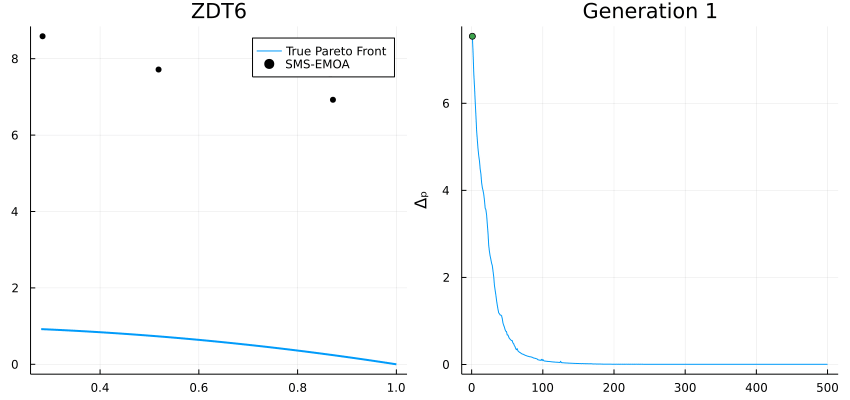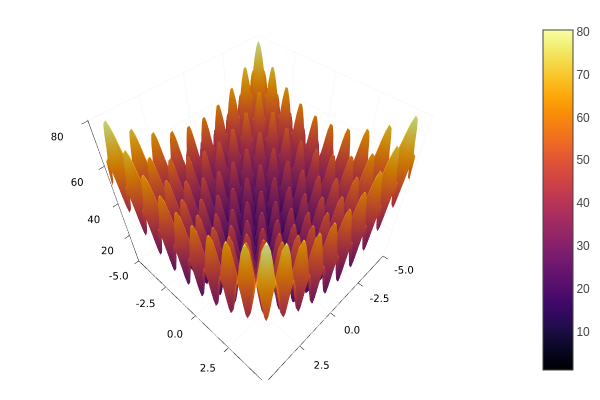High-performance metaheuristics for global optimization.
Open the Julia REPL and press ] to open the Pkg prompt. To add this package, use the add command:
pkg> add Metaheuristics
Or, equivalently, via the Pkg API:
julia> import Pkg; Pkg.add("Metaheuristics")Some representative metaheuristics are developed here, including those for single- and multi-objective optimization. Moreover, some constraint handling techniques have been considered in most of the implemented algorithms.
- ECA: Evolutionary Centers Algorithm
- DE: Differential Evolution
- PSO: Particle Swarm Optimization
- ABC: Artificial Bee Colony
- GSA: Gravitational Search Algorithm
- SA: Simulated Annealing
- WOA: Whale Optimization Algorithm
- MCCGA: Machine-coded Compact Genetic Algorithm
- GA: Genetic Algorithm
- BRKGA: Biased Random Key Genetic Algorithm
- MOEA/D-DE: Multi-objective Evolutionary Algorithm based on Decomposition
- NSGA-II: A fast and elitist multi-objective genetic algorithm: NSGA-II
- NSGA-III: Evolutionary Many-Objective Optimization Algorithm Using Reference-Point-Based Nondominated Sorting Approach
- SMS-EMOA: An EMO algorithm using the hypervolume measure as the selection criterion
- SPEA2: Improved Strength Pareto Evolutionary Algorithm
- CCMO: Coevolutionary Framework for Constrained Multiobjective Optimization
- GD: Generational Distance
- IGD, IGD+: Inverted Generational Distance (Plus)
- C-metric: Covering Indicator
- HV: Hypervolume
- Δₚ (Delta p): Averaged Hausdorff distance
- Spacing Indicator
- and more...
Multi-Criteria Decision Making methods are available, including:
- Compromise Programming
- Region of Interest Archiving
- Interface for JMcDM (a package for Multiple-criteria decision-making)
Assume you want to solve the following minimization problem.
Minimize:
where
Firstly, import the Metaheuristics package:
using MetaheuristicsCode the objective function:
f(x) = 10length(x) + sum( x.^2 - 10cos.(2π*x) )Instantiate the bounds:
D = 10
bounds = boxconstraints(lb = -5ones(D), ub = 5ones(D))Also, bounds can be a Matrix where the first row corresponds to the
lower bounds whilst the second row corresponds to the upper bounds.
Approximate the optimum using the function optimize.
result = optimize(f, bounds)Optimize returns a State datatype which contains some information about the approximation.
For instance, you may use mainly two functions to obtain such an approximation.
@show minimum(result)
@show minimizer(result)See the documentation for more details, examples and options.
Please cite the package using the bibtex entry
@article{metaheuristics2022,
doi = {10.21105/joss.04723},
url = {https://doi.org/10.21105/joss.04723},
year = {2022},
publisher = {The Open Journal},
volume = {7},
number = {78},
pages = {4723},
author = {Jesús-Adolfo Mejía-de-Dios and Efrén Mezura-Montes},
title = {Metaheuristics: A Julia Package for Single- and Multi-Objective Optimization},
journal = {Journal of Open Source Software} }or the citation string
Mejía-de-Dios et al., (2022). Metaheuristics: A Julia Package for Single- and Multi-Objective Optimization. Journal of Open Source Software, 7(78), 4723, https://doi.org/10.21105/joss.04723
in your scientific paper if you use Metaheristics.jl.
Please feel free to send me your PR, issue or any comment about this package for Julia.





